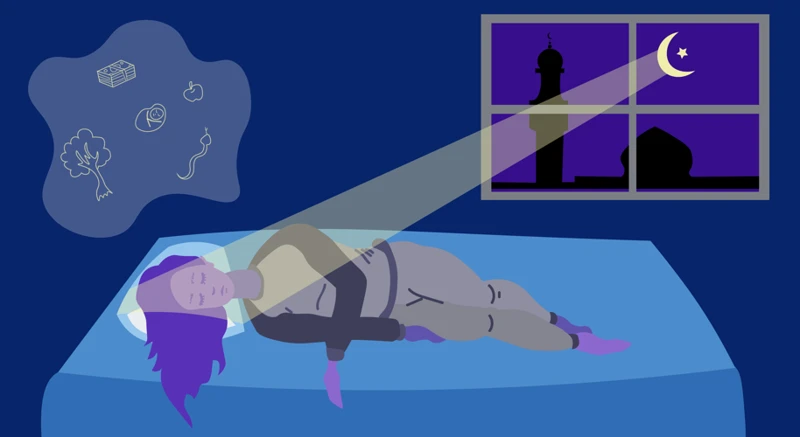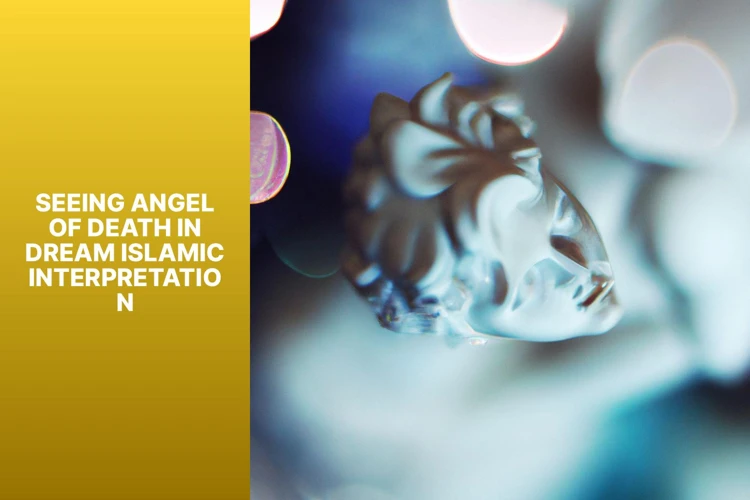Dreams have always fascinated and perplexed human beings. Across different cultures and religions, dreams hold significant meaning and offer insights into our innermost thoughts and emotions. In the Islamic tradition, dreams are regarded as a profound spiritual experience, believed to be a form of communication from Allah. One common dream that can leave individuals with a sense of unease and curiosity is seeing oneself die. In this article, we will delve into the Islamic interpretation of this dream, examining its symbolism, causes, effects, and various scenarios. By decoding the meaning behind seeing oneself die in a dream, we can gain a deeper understanding of its spiritual significance and personal reflection.
Understanding Dreams in Islam

Understanding dreams in Islam is crucial for Muslims, as they hold a significant place in the religion. Dreams are believed to be a form of communication from Allah, offering guidance and insights into one’s life. They are seen as a window to the unseen world, where the soul can transcend the limitations of the physical realm. In Islam, dreams are seen as a separate reality, a parallel dimension where the subconscious mind interacts with the spiritual realm. While dreams can have different meanings and interpretations, they are often seen as a reflection of one’s inner thoughts, desires, and emotions. The interpretation of dreams in Islam is a highly revered practice, with scholars and religious leaders providing guidance and insights into the symbolism and messages conveyed in dreams. For example, dreams about giving birth may signify new beginnings and blessings, as discussed in the article “Decoding the Meaning of Dream Giving Birth.” By understanding the significance and interpretation of dreams, individuals can gain valuable insights into their spiritual journey and personal growth.
1. Importance of Dreams
The importance of dreams in Islam cannot be understated. They are seen as a direct means of communication from Allah, offering insights, guidance, and messages to individuals. Dreams hold a special place in Islamic teachings, as they are believed to be a way for Allah to provide answers to questions, provide warnings or blessings, and even offer glimpses into the future. Prophet Muhammad himself placed great emphasis on the significance of dreams, stating that they are one of the forty-six parts of Prophethood. Dreams can serve as a source of inspiration, comfort, and direction for believers, offering them solace in times of distress or uncertainty. It is through the interpretation of dreams that believers can better understand the symbolism and messages conveyed within them. For instance, dreams about seeing an unknown dead person may hold symbolic meaning and require interpretation, as explored in the article “The Islamic Meaning of Seeing an Unknown Dead Person in a Dream: Decoding the Interpretation.” Recognizing the importance of dreams and their interpretation is crucial for Muslims seeking spiritual guidance and understanding.
2. Dream Interpretation in Islam
Dream interpretation in Islam is a fascinating and intricate field. It is based on the belief that dreams are a means of communication from Allah, providing guidance and messages to individuals. Scholars and experts in Islamic dream interpretation study the symbols, emotions, and scenarios in dreams to unravel their meanings. The process involves analyzing various elements of the dream, such as objects, people, and actions, and relating them to the individual’s waking life and spiritual journey. For example, dreams about teeth falling out may have symbolic representations, indicating anxieties, fears, or changes in one’s life. The article “Decoding the Meaning of Dreams Where Teeth Fall Out” explores the significance of this common dream and its interpretation in the Islamic context. Dream interpretation in Islam is not just about deciphering the symbols but also considering the individual’s unique experiences and personal context. It is a deep and insightful process that allows believers to gain a deeper understanding of themselves and their relationship with Allah.
Symbolism of Death in Islamic Dream Interpretation

The symbolism of death in Islamic dream interpretation is multifaceted and carries deep spiritual significance. First and foremost, death is seen as a symbol of transformation. In Islam, it is believed that death is not the end but rather a transition to the afterlife. Dreaming about one’s own death can signify the opportunity for personal growth and spiritual renewal. It serves as a reminder of the temporary nature of this worldly life and the eternal life that awaits in the hereafter. Additionally, death in dreams can serve as a reminder of mortality, urging individuals to reflect on their actions, seek repentance, and prioritize their spiritual well-being. Lastly, death in dreams can be interpreted as a sign of spiritual progress. It may indicate that the dreamer is shedding their old self, liberating themselves from negative traits or habits, and embarking on a path of spiritual enlightenment. The symbolism of death in Islamic dream interpretation invites individuals to contemplate their spiritual journey and strive for spiritual growth and righteousness.
1. Death as a Symbol of Transformation
Death in Islamic dream interpretation holds various symbolic meanings, one of which is transformation. Seeing oneself die in a dream often signifies a significant change or transition in one’s life. It can represent the end of a phase, the shedding of old habits, beliefs, or relationships, and the emergence of a new and improved version of oneself. This transformative symbolism of death in dreams aligns with the concept of spiritual growth and development in Islam. Just as a caterpillar undergoes a profound metamorphosis before transforming into a beautiful butterfly, the dream of death can indicate a similar process of personal evolution and self-discovery. It serves as a reminder to embrace change, let go of the past, and embark on a journey of self-improvement and spiritual enlightenment. This interpretation of death as a symbol of transformation aligns with other dream interpretations in Islam, such as seeing an unknown dead person in a dream, as discussed in the article “Seeing an Unknown Dead Person in Dream: Meaning and Interpretation.”.
2. Death as a Reminder of Mortality
Death, in the realm of Islamic dream interpretation, can serve as a powerful reminder of mortality. It brings forth an awareness of the transient nature of life, urging individuals to reflect upon their actions and purpose. The sight of oneself dying in a dream can symbolize the fragility of human existence and the inevitability of death. It serves as a wake-up call, prompting individuals to contemplate their deeds, prioritize their spiritual journey, and make the most of their time in this world. This dream may also remind Muslims of the importance of preparing for the afterlife and seeking forgiveness for their sins. It serves as a gentle reminder that life is a fleeting moment and that every soul will ultimately return to their Creator. Embracing this symbolism can inspire individuals to lead a more conscious and purposeful life, striving for righteousness and eternal salvation.
3. Death as a Sign of Spiritual Progress
In Islamic dream interpretation, death can also be seen as a sign of spiritual progress. When one sees themselves dying in a dream, it can symbolize the shedding of old beliefs, habits, and attachments. Just as physical death represents the end of one’s worldly existence, spiritual death signifies the transformation and growth of the soul. It indicates that the individual is ready to let go of their ego and embark on a journey of self-discovery and spiritual enlightenment. This dream may indicate that the person is breaking free from negative influences, purifying their heart, and striving towards a higher level of consciousness. It signifies a spiritual rebirth, where the individual is ready to embrace a new phase of their spiritual journey. This interpretation aligns with the concept of spiritual progression, where death represents a necessary step towards spiritual growth and closeness to Allah. As explained in the article “The Islamic Meaning of Seeing an Unknown Dead Person in a Dream: Decoding the Interpretation,” dreams involving death can have profound spiritual significance and should be seen as an opportunity for reflection and self-improvement.
Causes and Effects of Dreaming about One’s Own Death

Dreaming about one’s own death can have various causes and effects. On a psychological level, it may stem from feelings of fear, anxiety, or unresolved emotions. It could reflect a subconscious desire for change or signify a need for self-reflection. Spiritually, dreaming about one’s own death can indicate a transition or transformation in one’s life journey, representing a shedding of old beliefs or behaviors. Physically, it may be linked to factors such as illness, exhaustion, or stress. The effects of such dreams can vary from person to person, ranging from feelings of fear or unease to a heightened sense of self-awareness and spiritual growth. Understanding the causes and effects of dreaming about one’s own death can provide individuals with insights into their inner world and assist in personal development.
1. Psychological Factors
Psychological factors play a significant role in dreaming about one’s own death. Fear, anxiety, and stress can manifest in dreams as symbolic representations of death. The fear of the unknown, the fear of change, or the fear of losing control can all contribute to dreams of dying. Additionally, unresolved emotional issues or traumatic experiences can surface in dreams as a means of processing and healing. These dreams may reflect a need for inner transformation, a desire to let go of old patterns and beliefs, or a longing for a fresh start. Exploring these psychological factors can provide insights into one’s emotional well-being and serve as a catalyst for personal growth.
2. Spiritual Factors
2. Spiritual Factors
When it comes to dreaming about one’s own death in Islam, there are several spiritual factors that can contribute to this experience.
Firstly, it is believed that such dreams may be a sign of spiritual progress and purification. In Islam, death is seen as a transition to the eternal life and a chance for the soul to reunite with Allah. Dreaming about one’s own death can symbolize a spiritual awakening or a higher level of consciousness.
Additionally, these dreams can serve as a reminder of the transient nature of life and the importance of preparing for the Hereafter. They can inspire individuals to reflect on their actions, seek repentance, and strive to lead a righteous life.
Dreams about death can also be a means of warning or guidance from Allah. They may indicate the need for individuals to reevaluate their priorities, make necessary changes, and seek a closer connection with their faith.
The spiritual factors behind dreaming about one’s own death in Islam emphasize the significance of the soul’s journey and the pursuit of spiritual growth and enlightenment. By reflecting on the spiritual implications of such dreams, individuals can gain a deeper understanding of their own spiritual path and the teachings of Islam.
3. Physical Factors
Physical factors can also play a role in dreaming about one’s own death in Islam. These factors can include changes in sleep patterns or disruptions in one’s circadian rhythm, which can lead to vivid or intense dreams. Additionally, certain medications or substances, such as alcohol or drugs, can affect the content and intensity of dreams. Stress and fatigue can also impact the quality of sleep and dream experiences. It is important to note that physical factors alone may not be the sole cause of dreaming about death, but they can contribute to the overall dream experience.
Interpreting Different Scenarios of Seeing Yourself Die

Interpreting different scenarios of seeing oneself die in a dream can provide deeper insights into its meaning and implications. One possible scenario is experiencing a peaceful death in a dream. This may symbolize a sense of inner peace, contentment, and acceptance of mortality. It could indicate a spiritual transformation or the end of a difficult chapter in one’s life. Another scenario is encountering a violent death in a dream. This may represent unresolved issues, internal conflicts, or external challenges that need to be addressed. It could be a reminder to confront and overcome obstacles in order to find inner harmony. Lastly, the scenario of death and rebirth in a dream holds profound symbolism. It suggests the potential for personal growth and transformation, where one leaves behind old ways and emerges into a new phase of life. The interpretation of seeing oneself die in a dream should consider the specific details and emotions experienced, as they play a crucial role in understanding its unique meaning for the dreamer’s spiritual journey and self-reflection.
1. Peaceful Death
A peaceful death is a scenario that is often experienced in dreams where an individual sees themselves passing away in a tranquil and serene manner. In Islamic dream interpretation, this vision can signify the culmination of a spiritual journey or the attainment of inner peace and tranquility. It may represent the end of a difficult phase in life and the beginning of a new chapter filled with spiritual growth and contentment. This dream can serve as a reminder to focus on cultivating good deeds and maintaining a strong connection with Allah. It can also serve as reassurance that one’s eventual passing will be peaceful and that they will be embraced by Allah’s mercy. A peaceful death in a dream can be seen as a blessing and a sign of spiritual progress.
2. Violent Death
Violent death is another scenario that may be experienced in dreams of seeing oneself die. This type of dream can be intense and unsettling, as it involves sudden and traumatic events leading to death. In the Islamic interpretation, a violent death in a dream can symbolize a sense of loss, struggle, or conflict in one’s waking life. It may reflect internal battles, external challenges, or unresolved issues that need to be addressed. A dream of a violent death could serve as a reminder to examine the sources of conflict and find ways to resolve them. It is important to note that dreams are highly subjective, and the interpretation of a violent death dream can vary depending on the individual’s personal circumstances and experiences. It is recommended to seek guidance from a knowledgeable scholar or religious leader for a more specific understanding and interpretation of this dream scenario.
3. Death and Rebirth
In Islamic dream interpretation, the scenario of death and rebirth holds profound symbolism. It represents the transformative power of death, where one aspect of life ends to make way for new beginnings. This dream may signify personal growth, spiritual development, and the shedding of old ways and beliefs. Just as the physical body experiences death and decay to bring forth new life, the dream of death and rebirth symbolizes the potential for positive change and rejuvenation in one’s life. It can be seen as a sign of inner transformation, encouraging individuals to let go of past limitations and embrace a renewed sense of purpose and direction. This dream scenario often serves as a reminder that even though we may encounter challenges and setbacks, they ultimately lead to spiritual growth and a fresh start.
Spiritual Significance and Personal Reflection
The spiritual significance of seeing oneself die in a dream goes beyond its literal interpretation. It serves as a catalyst for personal reflection and introspection. This dream often prompts individuals to evaluate their lives, their beliefs, and their actions. It reminds them of the temporality of life and the importance of focusing on their spiritual journey. By contemplating death in the dream realm, individuals are encouraged to make positive changes, seek forgiveness, and strive for a closer connection to Allah. This dream can also serve as a reminder to prioritize the things that truly matter and to let go of worldly attachments. It encourages individuals to seek inner peace and spiritual growth. Personal reflection plays a vital role in understanding the unique symbolism and message of the dream. It helps individuals decipher the specific aspects of their lives that the dream may be addressing. By delving into their thoughts, emotions, and experiences, individuals can gain a deeper understanding of the spiritual significance of this dream and its implications for their personal journey.
Conclusion
In conclusion, the Islamic interpretation of seeing oneself die in a dream offers a profound understanding of its symbolism and significance. While death in dreams can be unsettling, it is often seen as a symbol of transformation, reminding individuals of their mortality and serving as a sign of spiritual progress. The causes and effects of dreaming about one’s own death can be attributed to psychological, spiritual, and physical factors. Interpreting different scenarios of seeing oneself die, whether it is a peaceful death, a violent death, or a death followed by rebirth, provides further insights into the spiritual journey and personal reflection. By delving into the Islamic meaning of this dream, individuals can gain a deeper understanding of themselves and their connection to the divine. Dreams hold a special place in Islam, offering guidance and revelations from Allah, and exploring their meanings can be a powerful tool for self-reflection and spiritual growth.
Frequently Asked Questions
1. Can dreams have spiritual significance in Islam?
Yes, dreams hold great spiritual significance in Islam. They are believed to be a means of communication from Allah and can provide guidance, warnings, or blessings. Muslims are encouraged to pay attention to their dreams and seek interpretation to understand their spiritual messages.
2. Are all dreams considered meaningful in Islam?
In Islam, not all dreams are considered meaningful. Some dreams may simply be a reflection of one’s thoughts or experiences from the day. However, there are certain dreams that hold deeper spiritual significance and are believed to be messages from Allah. It is important to seek interpretation from knowledgeable individuals to distinguish between regular dreams and meaningful ones.
3. Is there a prescribed method for interpreting dreams in Islam?
Yes, there are guidelines for interpreting dreams in Islam. Scholars often refer to the Quran, Hadith (sayings of the Prophet Muhammad), and the teachings of trusted Islamic scholars to decode the symbolism and messages within dreams. It is recommended to consult knowledgeable individuals or seek interpretations from trusted sources.
4. What does it mean to see oneself die in a dream in Islam?
Seeing oneself die in a dream can have various interpretations in Islam. It is often seen as a symbol of transformation, reminding the dreamer of their mortality, or indicating spiritual progress. The specific meaning can depend on the circumstances and emotions experienced during the dream.
5. Can dreaming about death be a sign of something negative in Islam?
In Islam, dreaming about death does not necessarily indicate something negative. While it can be unsettling, it is important to seek interpretation to understand the specific meaning. Dreams about death can serve as reminders of the temporary nature of life and can prompt individuals to reflect on their spiritual journey.
6. Are there physical factors that can influence dreams in Islam?
Yes, physical factors can influence dreams in Islam. Factors such as one’s health, diet, and lifestyle can impact the content and quality of dreams. For example, an individual experiencing physical discomfort or stress may have more unsettling dreams compared to someone who is in good health.
7. How do psychological factors play a role in dream interpretation in Islam?
Psychological factors are considered in the interpretation of dreams in Islam. Emotions, fears, suppressed thoughts, and subconscious desires can influence the symbolism and content of dreams. Understanding one’s mental and emotional state can provide valuable insights into the meaning behind the dream.
8. Can dreams in Islam be seen as premonitions?
In Islam, dreams can be seen as premonitions or glimpses into the future. However, it is important to approach such dreams with caution and seek interpretation from qualified individuals. Not all dreams are prophetic, and proper interpretation is needed to understand the true meaning and significance.
9. What role does prayer and supplication play in dream interpretation in Islam?
Prayer and supplication are considered essential in seeking guidance and understanding the meaning behind dreams in Islam. Muslims are encouraged to pray to Allah for clarity and seek His guidance in interpreting dreams. Seeking spiritual purification through prayers and supplications can assist in understanding the divine messages hidden within dreams.
10. How can individuals benefit from understanding the meaning of their dreams in Islam?
Understanding the meaning of dreams in Islam can offer valuable insights into one’s spiritual journey and personal growth. It can provide guidance, reassurance, or highlight areas of improvement. By reflecting on dreams and seeking interpretation, individuals can align their actions and intentions with their spiritual goals and strive for a deeper connection with Allah.







